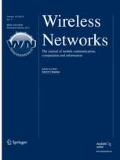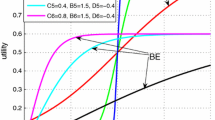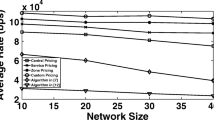Abstract
In this paper, we propose a unified framework for opportunistic fair scheduling in wireless systems. We consider a TDMA type of multiple access scheme, in which only one user can be scheduled in each time-slot. For opportunistic fair scheduling in such a system, some nice frameworks have been developed in the previous works, such as Agrawal and Subramanian (Allerton conference on communication, control and computing, 2002), Liu et al. (IEEE Journal of Selected Areas in Communications 19(10): 2053–2065, 2001) and Liu et al. (Computer Networks 41(4): 451–474, 2003). However, in this paper, we consider a more general problem that can accommodate more general types of fairness, and more general types of utility functions than those in the previous works. In addition to those generalizations, we develop a new framework for opportunistic fair scheduling based on the duality theory, which is different from those in the previous works. The duality theory is a well-defined theory in the mathematical optimization area. Hence, it can provide a unified framework for many different types of problems. In fact, we show that two different frameworks in Agrawal and Subramanian (Allerton conference on communication, control and computing, 2002), Liu et al. (IEEE Journal of Selected Areas in Communications 19(10): 2053–2065, 2001) and Liu et al. (Computer Networks 41(4): 451–474, 2003) are special cases of ours. In addition, by using the unified framework developed in this paper, we can not only develop various opportunistic fair scheduling schemes but also analyze the developed algorithm more rigorously and systematically.





Similar content being viewed by others
Notes
In this paper, the terminology ‘fairness’ is used to represent not only the relative performance among users but also the absolute performance of each user such as the quality of service.
Note that this assumption is not restrictive, since in a real system, the channel quality of a user is mapped into a level set with a finite number of levels by using quantization.
The probability p s i can be interpreted as the rate with which user i is scheduled in time-slots with system state s.
Even though we consider a general linear function such as f(x) = ax + b, the framework and algorithm developed in this paper can be still applied without any modification. For example, if V(x) = ax + b for users in M V L , then we only have to change the second constraint in problem (4) as \(\sum\limits_{s \in S} \pi^s \sum\limits_{k \in M} a_{i,k}^s p_k^s \geq (C_i-b)/a = C_i', \quad \forall i \in M_{L}^V\).
References
Agrawal, R., & Subramanian, V. (2002). Optimality of certain channel aware scheduling policies. In: Allerton conference on communication, control and computing.
Agrawal, R., Subramanian, V., & Berry, R. (2004). Joint scheduling and resource allocation in CDMA systems. In: WiOpt’04.
Hu, M., Zhang, J. (2004). Opportunistic multi-acess: Multiuser diversity, relay-aided opportunistic scheduling, and traffic-aided smooth admission control. Mobile Networks and Applications, 9(4), 435–444.
Huang, J., Subramanian, V., Agrawal, R., & Berry, R. (2009). Downlink scheduling and resource alloction for OFDM systems. IEEE Transactions on Wireless Communications, 8(1), 1–9.
Jain, R., Chiu, D., & Hawe, W. (1984). A quantitative measure of fairness and discrimination for resource allocation in shared computer systems. Technical report.
Jalali, A., Radovani, R., & Rankai, R. (2000). Data throughput of CDMA HDR a high efficiency-high data rate personal communication wireless system. In: IEEE VTC’00-Spring (pp. 1854–1858).
Kall, P., & Wallace, S. W. (1994). Stochastic programming. New York: Wiley.
Kim, H., Han, Y. (2005). A proportional fair scheduling for multicarrier transmission systems. IEEE Communications Letters, 9(3), 210–212.
Kulkarni, S. S., & Rosenberg, C. (2003). Opportunistic scheduling for wireless systems with multiple interfaces and multiple constraints. In: ACM international workshop on modeling, analysis, and simulation of wireless and mobile systems.
Lee, H. W., & Chong, S. (2008). Downlink resource allocation in multi-carrier systems: Frequency-selective vs. equal power allocation. IEEE Transactions on Wireless Communications, 7(10), 3738–3747.
Lee, J. W., & Kwon, J. A. (2008). A new framework for opportunistic scheduling in wireless networks. In: ISITA’08.
Lee, J. W., Mazumdar, R. R., & Shroff, N. B. (2006). Opportunistic power scheduling for dynamic multi-server wireless systems. IEEE Transactions on Wireless Communications, 5(6), 1506–1515.
Liu, X., Chong, E. K. P., Shroff, N. B. (2001). Opportunistic transmission scheduling with resource sharing constraints in wireless networks. IEEE Journal of Selected Areas in Communications, 19(10), 2053–2065.
Liu, X., Chong, E. K. P., & Shroff, N. B. (2003). A framework for opportunistic scheduling in wireless networks. Computer Networks, 41(4), 451–474.
Liu, Y., & Knightly, E. (2003). Opportunistic fair scheduling over multiple wireless channels. In: IEEE Infocom’03 (Vol. 2, pp. 1106–1115).
Mo, J., & Walrand, J. (2000). Fair end-to-end window-based congestion control. IEEE/ACM Transactions on Networking, 8(5), 556–567.
Rockafellar, R. T., & Wets, R. J. B. (1976). Stochastic convex programming: Basic duality. Pacific Journal of Mathematics, 62(1), 173–195.
Zhang, Z., He, Y., & Chong, E. K. P. (2008). Opportunistic scheduling for OFDM systems with fairness constraints. EURASIP Journal on Wireless Communications and Networking.
Acknowledgments
This research was supported in part by NAP of Korea Research Council of Fundamental Science & Technology, and Basic Science Research Program through the National Research Foundation of Korea (NRF) funded by the Ministry of Education, Science and Technology (2009-0067264).
Author information
Authors and Affiliations
Corresponding author
Additional information
The earlier version of this paper was presented at ISITA 2008 [11].
Rights and permissions
About this article
Cite this article
Kwon, JA., Kim, BG. & Lee, JW. A unified framework for opportunistic fair scheduling in wireless networks: a dual approach. Wireless Netw 16, 1975–1986 (2010). https://doi.org/10.1007/s11276-010-0239-1
Received:
Accepted:
Published:
Issue Date:
DOI: https://doi.org/10.1007/s11276-010-0239-1




